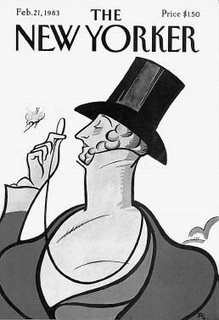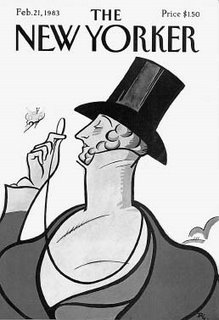 Apparently, my bittersweet relationship with New York magazine will now be permanent (perhaps I should save time and just apply to work there?), so every week I'll be thrilled by great writing even while I'm appalled at dismaying subjects. First it was an extremely well-written Evan Hughes piece on how the literary world once had the temerity to ignore the Lucretius-Cicero-Catullus troika in its midst, and then it was Noreen Malone's equally extremely well-written piece on the "occupation" of Wall Street by the skinny-jeaned tobacco-addicted hordes of slackerdom, and now it's a piece in this current issue, a look at candidate Mitt Romney's past written with fantastic energy and intelligence by Ben Wallace-Wells. If writing for New York involved the privilege of working with such glowingly talented young people, it might be worth the agitation of the subjects they go after (and as an old friend of mine reminded me the other day, "they can't all be book reviewers")
Apparently, my bittersweet relationship with New York magazine will now be permanent (perhaps I should save time and just apply to work there?), so every week I'll be thrilled by great writing even while I'm appalled at dismaying subjects. First it was an extremely well-written Evan Hughes piece on how the literary world once had the temerity to ignore the Lucretius-Cicero-Catullus troika in its midst, and then it was Noreen Malone's equally extremely well-written piece on the "occupation" of Wall Street by the skinny-jeaned tobacco-addicted hordes of slackerdom, and now it's a piece in this current issue, a look at candidate Mitt Romney's past written with fantastic energy and intelligence by Ben Wallace-Wells. If writing for New York involved the privilege of working with such glowingly talented young people, it might be worth the agitation of the subjects they go after (and as an old friend of mine reminded me the other day, "they can't all be book reviewers")But oh, sometimes that agitation is very agitating! Take this October 31 issue, for instance. Ordinarily, I try to leave worrying about the 2012 presidential election to my Open Letters colleague Greg Waldmann, but it's impossible for any resident of Boston to ignore a story like this about the financial background of Mitt (short for 'mitten'?) Romney, who briefly paused as governor of Massachusetts before he launched himself into national politics (I realize its an unpopular stance, but I miss Governor Weld precisely because Massachusetts wasn't some sort of cheap consolation prize to him - it was more along the lines of a family heirloom, to be lovingly cared for and justifiably bragged about). I've been looking at his 2012 candidacy as something of a joke, I admit. Not only has he flip-flopped on virtually every major 'official' position he's ever held (which once upon a time was the kiss of death for a candidate), but (don't tell my young Facebook friends!) I've been tremendously impressed by President Obama in the last three years and was sort of hoping the 2012 election would be a simple walk to his re-election.
That's clearly not going to happen, alas (I have abyssmal luck with '12 presidential elections, I guess) - the American voting public is still largely stupid (blaming President Obama for a recession created by his predecessor) and largely racist (blaming President Obama just for being), so 2012 will be a hotly-contested race that the incumbent stands every chance of losing. So serious attention has to be paid to his front-running possible opponents in the general election, and the aforementioned Greg Waldmann tells me with complete confidence that the foremost of these will be Mitt Romney. Sigh.
Wallace-Wells obviously believes it too. This piece, "The Romney Economy" has nothing of the jaunty
 tone you'd find in a profile of, say, Michele Bachmann or any of the other large number of obviously insane hopefuls spewing hate in Iowa these days. Wallace-Wells clearly thinks Romney is as serious as a heart attack, and the article's digging into his past with the financial consulting firm Bain Capital ought to get readers thinking. Reading this piece, with its pitch-perfect evocations of Romney's world ("Romney's father had been the head of American Motors Corporation, the governor of Michigan, and a member of Nixon's cabinet; the is no credible way to describe the American elite that excludes Romney"), you come away with one certainty beyond all others: if the "1%" being decried by the smelly, iPad-using occupiers of Wall Street really exists, Mitt Romney is its living embodiment. His career of raping companies, impatiently waiting nine months, then selling the babies to the highest bidder before dashing off to his next rape is clearly detailed by Wallace-Wells, who brings up a few of the many malpractice lawsuits brought against Bain but stops short - as he has to, as his editors at New York would certainly told him to - of drawing the obvious conclusions about them.
tone you'd find in a profile of, say, Michele Bachmann or any of the other large number of obviously insane hopefuls spewing hate in Iowa these days. Wallace-Wells clearly thinks Romney is as serious as a heart attack, and the article's digging into his past with the financial consulting firm Bain Capital ought to get readers thinking. Reading this piece, with its pitch-perfect evocations of Romney's world ("Romney's father had been the head of American Motors Corporation, the governor of Michigan, and a member of Nixon's cabinet; the is no credible way to describe the American elite that excludes Romney"), you come away with one certainty beyond all others: if the "1%" being decried by the smelly, iPad-using occupiers of Wall Street really exists, Mitt Romney is its living embodiment. His career of raping companies, impatiently waiting nine months, then selling the babies to the highest bidder before dashing off to his next rape is clearly detailed by Wallace-Wells, who brings up a few of the many malpractice lawsuits brought against Bain but stops short - as he has to, as his editors at New York would certainly told him to - of drawing the obvious conclusions about them.But even more unsettling than the prospect of Americans electing as President a junk-bond huckster is the prospect of that junk-bond huckster not even believing in junk bonds - or anything else. Wallace-Wells eventually confronts the subject of all that flip-flopping when he comes to the subject that'll be hardest for Romney to weasel out of in the general election: the fact that when he was governor, he passed a version of universal health-care that's extremely similar to the 'Obamacare' the President's opponents hate because he's black. Here Wallace-Wells is both instructive and insightful:
But what separates Romney's plan from Obama's - and gives some clues about his potential presidency - is its almost-accidental origin. Romney did not begin with a philosophical quest to improve American health care. He began with the idea of himself as a problem solver and asked those around him for a problem that he might usefully solve. I remembered, when I was told this story, an anecdote I'd heard from a former political staffer of Romney's. On even basic philosophical questions like abortion, the staffer said, Romney did not try to resolve the question in the abstract, as a matter of principle, and would consider instead various hypothetical cases - for instance, a late-term abortion - and build from them a politics. The line that Romney is a flip-flopper may vastly understate the depth of the condition.
That's great stuff, though terrifying, and it proves that I should never assume I've seen the worst that U.S. presidential politics can deliver. Wallace-Wells calls Romney a "perfectly objective efficiency machine," but such a thing can't be: the very nature of efficiency involves a goal, and goals preclude objectivity. More accurate to say Romney is "a perfectly efficient Romney machine" whose goal is the presidency, regardless of what he has to say or unsay, believe or unbelieve. It's the close reflection of his days at Bain: personal profit over not only ethics but everything. After eight long years of the nation and the world suffering because Americans elected a man who cared about nothing more than just being president, the country came a whisker away from doing it again by electing John McCain ("We're gonna drill right now, my friends! We're gonna drill right in the middle of Yellowstone! Drill! Drill! Drill!"). Sanity prevailed ("that one" got elected), but in America, sanity has to re-fight its title bout every four years - and, Gawd help us all, Mitten Romney is a contender.
My only consolation would be if Wallace-Wells opts to chronicle the whole sorry spectacle. But who'd want to wish that on anybody?

























